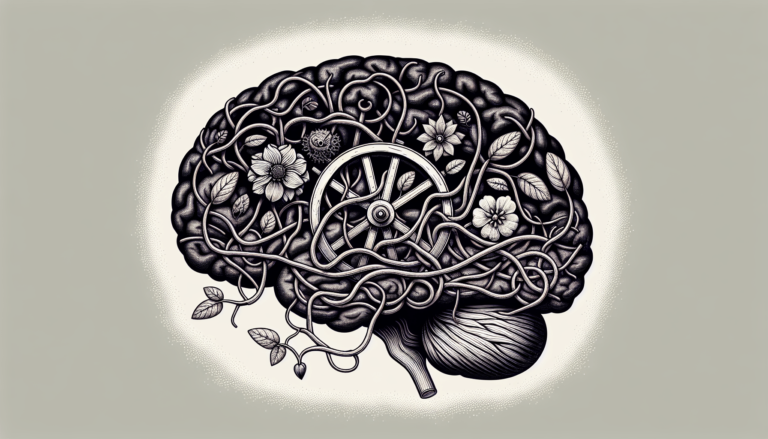Cultivating A Habit Of Continuous Learning For Personal Growth
Imagine a world where every day is an opportunity to learn and grow, where curiosity is fostered and knowledge is constantly pursued. In the pursuit of personal growth, cultivating a habit of continuous learning becomes paramount. By actively seeking out new knowledge and experiences, you open the doors to endless possibilities and unlock the potential within yourself. Whether it’s discovering a new hobby, mastering a new skill, or expanding your understanding of the world, embracing a mindset of continuous learning can transform your life in profound ways. So, let’s embark on this journey of self-improvement together, and discover the transformative power of lifelong learning.
Importance of Continuous Learning
Continuous learning is an essential aspect of personal growth and development. By actively engaging in the expansion of your knowledge and skills, you can stay relevant in a changing world, increase your personal effectiveness, and ultimately improve your overall quality of life.
Expanding knowledge and skills
One of the primary reasons why continuous learning is important is because it allows you to expand your knowledge and acquire new skills. In today’s fast-paced world, information is constantly evolving, and it is crucial to stay updated on the latest trends and developments in your field. By continuously learning, you can broaden your understanding of various subjects and acquire new skills that can enhance your professional and personal life.
Staying relevant in a changing world
The world is constantly evolving, and new technologies, methodologies, and approaches emerge regularly. To stay relevant in your profession or industry, it is vital to embrace continuous learning. By keeping up with the latest advancements, you can adapt to changes more effectively and position yourself as a valuable asset in your field. Continuous learning enables you to remain competitive and ensures that you are equipped with the knowledge and skills required to thrive in today’s dynamic environment.
Increasing personal effectiveness
Continuous learning not only enhances your professional life but also improves your personal effectiveness. By continually seeking new knowledge and skills, you can become more efficient and productive in various aspects of your life. Whether it is improving your time management, communication skills, or problem-solving abilities, continuous learning equips you with the tools needed to become a more effective individual. It enables you to overcome challenges, make informed decisions, and achieve your goals more efficiently.
Benefits of Continuous Learning
Continuous learning offers numerous benefits that can positively impact your personal and professional life. By actively engaging in ongoing learning experiences, you can unlock the following advantages:
Improved job performance
Continuous learning plays a vital role in improving job performance. By acquiring new knowledge, skills, and techniques, you can enhance your abilities and contribute more effectively to your organization. Ongoing learning enables you to stay updated on industry best practices, innovative strategies, and emerging trends, which can help you perform your job more efficiently and deliver exceptional results.
Enhanced problem-solving abilities
Learning new concepts and acquiring diverse skills allows you to become a more effective problem solver. Continuous learning exposes you to various perspectives and approaches, enabling you to think critically and find innovative solutions to complex challenges. It broadens your horizons and equips you with the knowledge and skills needed to analyze problems, identify opportunities, and make informed decisions.
Increased creativity and innovation
Continuous learning fuels creativity and fosters innovation. By exploring new subjects, engaging with diverse perspectives, and acquiring different skills, you can expand your creativity and freshen your perspective. Continuous learning encourages you to think outside the box, challenge the status quo, and come up with imaginative solutions to problems. It cultivates an environment that nurtures innovation and allows you to make valuable contributions to your field.
Expanded career opportunities
By engaging in continuous learning, you open yourself up to a world of expanded career opportunities. With a constantly evolving job market, employers are increasingly seeking individuals who are committed to lifelong learning. Continuous learning allows you to stay ahead of the curve, enhance your skill set, and broaden your career prospects. It equips you with the qualifications and expertise needed to explore different roles, industries, or even start your own business.
Boosted self-confidence
Continuous learning has a profound impact on your self-confidence. As you acquire new knowledge and skills, you become more competent and capable. This newfound expertise instills a sense of confidence in your abilities, enabling you to tackle challenges with a positive mindset. The more you learn and grow, the more confident you become in your capabilities, empowering you to pursue new opportunities and take on greater responsibilities.

Identifying Learning Goals
Before embarking on your continuous learning journey, it is essential to identify your learning goals. Setting clear objectives allows you to focus your efforts, track your progress, and stay motivated. Here are some key steps to help you identify your learning goals:
Assessing strengths and weaknesses
Start by assessing your strengths and weaknesses. Identify areas where you excel and areas where you would like to improve. By understanding your current skill set, you can determine the gaps that need to be filled and prioritize your learning accordingly.
Setting realistic and achievable goals
When setting your learning goals, it is crucial to be realistic and ensure they are attainable. Set goals that are specific, measurable, achievable, relevant, and time-bound (SMART goals). This approach will provide you with clear targets to strive for and enable you to track your progress effectively.
Aligning goals with personal values and interests
To maintain motivation and engagement, it is essential to align your learning goals with your personal values and interests. Choose subjects or skills that resonate with you and align with your passions. By pursuing topics that genuinely excite you, you are more likely to remain committed to your learning journey.
Prioritizing learning areas
With so much to learn, it is crucial to prioritize your learning areas. Determine which skills or subjects are most relevant to your personal or professional growth and start with those. By focusing your efforts on areas that are most beneficial to you, you can make the most out of your continuous learning experience.
Creating a Learning Plan
Once you have identified your learning goals, it is time to create a comprehensive learning plan. A well-designed learning plan provides structure and guidance, helping you stay organized and on track with your continuous learning journey. Here are some steps to create an effective learning plan:
Committing to lifelong learning
Start by committing to the philosophy of lifelong learning. Embrace the idea that learning is a lifelong process and that every experience presents an opportunity to learn and grow. Adopting this mindset sets the foundation for a successful learning plan.
Identifying available resources
Next, identify the resources available to you. These may include books, online courses, workshops, mentors, or educational platforms. Take the time to explore and choose resources that align with your learning goals and preferences.
Establishing a schedule and learning routine
To ensure consistency in your learning journey, establish a schedule and learning routine. Determine the time of day or week that works best for you to dedicate to learning activities. Consistency is key in continuous learning, and establishing a routine ensures that learning becomes a habit.
Setting milestones and deadlines
To stay motivated and track your progress, set milestones and deadlines for your learning goals. Break down your goals into smaller, manageable tasks and assign deadlines to each. Celebrating the completion of milestones reinforces your commitment and keeps you motivated to continue your learning journey.

Effective Learning Strategies
To maximize the benefits of continuous learning, it is important to employ effective learning strategies. Here are some strategies to consider:
Active learning techniques
Active learning techniques, such as self-quizzing, summarizing information, and teaching others, allow you to engage more actively with the material you are learning. By actively participating in the learning process, you enhance your understanding and retention of the information.
Utilizing various learning modalities
Everyone learns differently, so it is essential to utilize various learning modalities. Incorporate visual, auditory, and kinesthetic learning techniques into your learning process. This may include watching videos, listening to podcasts, attending workshops, or engaging in hands-on activities.
Seeking feedback and reflection
Regularly seek feedback on your progress and reflect on your learning experiences. Feedback helps you understand areas where you can improve and provides valuable insights from others. Additionally, taking the time to reflect on what you have learned allows for deeper understanding and integration of new knowledge.
Engaging in self-directed learning
Take ownership of your learning by engaging in self-directed learning. Proactively seek out learning opportunities and resources that align with your goals. This could involve reading books, pursuing online courses, or attending webinars that cater to your specific interests and needs.
Maintaining curiosity and an open mind
Maintaining a sense of curiosity and an open mind is crucial in continuous learning. Embrace new ideas, challenge your existing beliefs, and explore different perspectives. Cultivating a curious mindset allows for continuous growth and expands your learning horizons.
Overcoming Learning Challenges
While continuous learning brings tremendous benefits, it is not without its challenges. Here are some common challenges that learners face and strategies to overcome them:
Overcoming time constraints
Time constraints are a common obstacle to continuous learning. To overcome this challenge, prioritize learning and make it a non-negotiable part of your routine. Allocate dedicated time for learning activities and eliminate non-essential tasks or distractions that may impede your progress.
Managing distractions
In today’s digital age, managing distractions can be a challenge. Practice discipline by limiting your exposure to distracting stimuli such as social media notifications or email alerts during your designated learning time. Create a focused learning environment that minimizes potential distractions.
Dealing with setbacks and failures
Setbacks and failures are valuable learning opportunities. Embrace these experiences as chances to grow and learn from your mistakes. View setbacks as temporary obstacles rather than permanent barriers to progress. Adjust your approach if needed and keep moving forward.
Seeking support and collaboration
Seeking support and collaboration can help overcome learning challenges. Engage with like-minded individuals, join study groups, or seek guidance from mentors or experts in your field. Sharing experiences and seeking support can provide valuable insights, encouragement, and accountability on your continuous learning journey.
Leveraging Technology and Online Learning
In today’s digital age, technology and online learning platforms offer a wealth of resources for continuous learning. Here are some ways to leverage technology and online learning to enhance your learning experience:
Exploring online courses and platforms
Online courses and platforms provide accessible and flexible learning opportunities. Explore reputable platforms that offer courses related to your learning goals. These platforms often provide a range of subjects, expert instructors, and interactive learning activities that can enhance your learning experience.
Utilizing educational apps and tools
Educational apps and tools can be valuable companions in your continuous learning journey. These apps provide a wide range of functionalities, including note-taking, flashcards, language learning, and productivity tools. Utilize these apps to reinforce your learning and make the most out of your study sessions.
Engaging in virtual communities and forums
Engaging in virtual communities and forums allows you to connect with other learners and experts in your field. Join online communities relevant to your learning goals and actively participate in discussions. These virtual communities provide opportunities for networking, knowledge sharing, and gaining insights from experienced professionals.
Accessing digital libraries and resources
Digital libraries and resources offer a vast array of information and materials for continuous learning. Explore online libraries, research databases, and reputable websites to access books, articles, research papers, and other resources that align with your learning goals. Take advantage of these digital resources to enhance your understanding and knowledge on various subjects.
Creating a Learning Environment
Creating an optimal learning environment significantly contributes to the success of your continuous learning journey. Here are some ways to cultivate a learning-friendly environment:
Establishing a dedicated study space
Designate a specific area in your home or workspace as your dedicated study space. This space should be free from distractions, comfortable, and organized. Having a designated study space helps condition your mind for focused learning and minimizes potential interruptions.
Eliminating distractions
To create an environment conducive to learning, eliminate distractions as much as possible. Put your phone on silent mode, close unnecessary tabs on your browser, and inform others around you about your study time. Minimizing distractions allows for better concentration and focus on your learning materials.
Cultivating a growth mindset
Cultivating a growth mindset is crucial for continuous learning. Embrace the belief that intelligence and skills can be developed through effort and experience. Embrace challenges, persevere through setbacks, and view mistakes as valuable learning opportunities. A growth mindset fosters resilience, motivation, and a commitment to lifelong learning.
Building a supportive network
Surround yourself with a supportive network of individuals who share your passion for continuous learning. Engage with like-minded individuals, join learning communities, or seek mentors who can provide guidance and support. Building a supportive network ensures that you have a support system to lean on during your learning journey.
Celebrating Milestones and Progress
Recognizing and celebrating milestones and progress is essential to stay motivated and maintain enthusiasm in your continuous learning journey. Here are some ways to celebrate your accomplishments:
Recognizing achievements and milestones
Take time to acknowledge your achievements and milestones along the way. Celebrate completing a challenging course, acquiring a new skill, or reaching a significant milestone in your learning plan. Recognizing your accomplishments reinforces your commitment and boosts your confidence.
Rewarding oneself for progress
Reward yourself for your progress and hard work. Plan small rewards for yourself upon reaching specific milestones or accomplishing particular goals. These rewards can be as simple as treating yourself to a movie night, buying a book you’ve been wanting, or taking a day off to relax and recharge.
Sharing accomplishments with others
Share your accomplishments and milestones with others. Celebrate your successes with friends, family, or colleagues who have supported you throughout your learning journey. Sharing your accomplishments not only provides a sense of fulfillment but also inspires and motivates others to embark on their own continuous learning journeys.
Continuously Evaluating and Adjusting
Continuous learning is an ongoing process that requires periodic evaluation and adjustment. Regularly reflect on your learning experiences, assess your progress, and make necessary adjustments to maximize your learning outcomes. Here are some key practices for evaluating and adjusting your learning approach:
Reflecting on learning experiences
Carve out time for regular reflection on your learning experiences. Reflect on what you have learned, how you have grown, and how it has impacted your personal and professional life. This reflection allows for deeper insight into your learning journey and helps you identify areas for improvement.
Assessing progress towards goals
Regularly assess your progress towards your learning goals. Review the milestones you have achieved and the tasks you have completed. Evaluate how effectively you have accomplished your objectives and identify areas where you may need to adjust your learning strategies.
Identifying areas for improvement
Identify areas where you can improve your learning approach. Consider seeking feedback from mentors, peers within your field, or online communities. Embrace constructive criticism and use it as an opportunity to enhance your learning techniques and address any learning gaps.
Adapting learning strategies as needed
Be flexible and willing to adapt your learning strategies as needed. Continuous learning requires experimentation and adjustment. If a particular approach is not yielding the desired results, be open to trying different methods or resources. Adapt your learning strategies to align with your evolving goals and changing learning needs.
In conclusion, cultivating a habit of continuous learning is essential for personal growth and development. By expanding your knowledge and skills, staying relevant in a changing world, and increasing your personal effectiveness, you can unlock numerous benefits. By identifying your learning goals, creating a learning plan, employing effective learning strategies, and overcoming learning challenges, you set yourself up for success in your continuous learning journey. Remember to leverage technology and online learning, create a conducive learning environment, celebrate milestones, and continuously evaluate and adjust your learning approach. Embrace the philosophy of continuous learning, and you will unlock endless opportunities for personal and professional growth.







